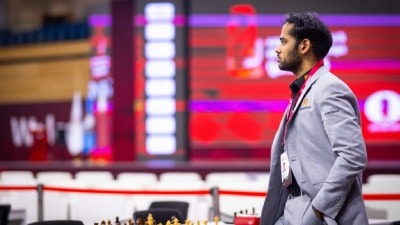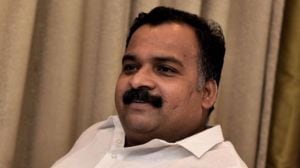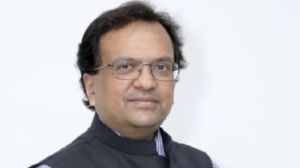Minister8217;s balderdash
Jaswant Singh is the only minister in this government with whom one can, or would want to, settle down to a drink. Which is what makes one...

Jaswant Singh is the only minister in this government with whom one can, or would want to, settle down to a drink. Which is what makes one wonder what on earth this urbane sophisticate has in common with the atavists he consorts with. Now one knows. For, at a Press conference in Israel, the external affairs minister made the astounding assertion that India had not extended full diplomatic recognition to Israel for over three decades because of the 8220;Muslim vote-bank8221;. Shows he really is one of them; not, as one had fondly hoped, actually one of us.
Jaswant8217;s assertion is nonsense. The division of Palestine was mooted at the same time as the division of India: 1947. Both vivisections were part of the Great British Scuttle, otherwise known as the End of Empire. Neither was a viable solution. Both have bred the most enduring conflicts of the last half-century. India opposed the division of Palestine for the same reason that India opposed the division of India. And it has taken 50 years for Palestine and Israel to come around to recognising what was self-evident to us five decades ago: that co-existence is the only enduring way of dealing with diversity.
Singh clearly needs to brush up his West Asian history. India was included in the UN committee established in April 1947 to suggest the modality for terminating the British mandate in Palestine. The Big Five stood for partition. The Arabs demanded independence with no provision for a Jewish homeland. India urged a federal solution: autonomy for the Jewish and Arab regions respectively but within the framework of a unified Palestinian state in which federal subjects would be administered by a democratically elected federal government. Not only did the Zionists reject the federal solution, so did the Arabs. So much for the 8220;Muslim vote-bank8221;.
Palestine was partitioned in November 1947 by a UN resolution. Without waiting for the resolution to be implemented, the Zionists launched a vicious terrorist war both against the Palestinian Arabs and against the Mandated Authority.
The Brits just walked out of their responsibilities on May 14, 1948. And Ben Gurion declared independence. The boundaries of his state were far in excess of the lands detailed in the partition plan of the United Nations. It was land conquered from the Arabs, who were driven like sheep from their homeland to manufacture a homeland for the Jews. That is why what the Jews call Independence, the Palestinians call Al-Naqba 8212; the Catastrophe.
A year later, in 1949, the UN recognised the state of Israel as a fait accompli. India, thereafter, was among the first to recognise Israel and establish consular relations with them, particularly to facilitate the emigration to Israel of large numbers of Indian Jews, partly from the Bombay area and mostly from Cochin. So much, Mr External Affairs Minister, Sir, for the 8220;Muslim vote-bank8221;.
Diplomatic recognition was delayed until Israel showed some evidence of implementing the Lausanne protocols, negotiated in early 1949, which dealt with the problems of a people 8212; the Palestinians 8212; uprooted from their lands and driven by the million from their homes. There was the bogus old Zionist thesis that their demand was 8220;A land without people for a people without land8221;8230;the native Palestinians reduced to an insignificant nothingness. It is this that had led Gandhiji to famously remark that 8220;Palestine belongs to the Palestinians as much as England to the English and France to the French8221;. The Palestinian struggle was always an integral part of the Indian struggle for independence. But how would Jaswant know that; the RSS cohorts had nothing to do with poorna swaraj even in the Quit India Movement. In keeping with the highest tenets of our freedom movement, India under Jawaharlal Nehru refused to extend diplomatic relations to Israel until some justice was assured to thePalestinians.
The collaboration between Imperialism and Israel was exposed in 1956 when Israel joined Britain and France in the invasion of Nasser8217;s Egypt in the aftermath of his nationalisation of the Suez Canal. In the process, all of the Sinai Peninsula was captured from Egypt by Israel. Eventually, American pressure forced France and the UK to call off their invasion and Israel to retreat behind its 1948 borders, but not until Ben-Gurion had visited the Monastery at St. Catherine8217;s and dared to write in the visitors8217; book there, 8220;We shall yet return8221;. The Zionist objective has ever been not the Israel of contemporary history but Eretz Israel, the Israel of the Old Testament, extending the 8220;land of milk and honey8221; to all of Palestine and much beyond, with place only for the Chosen People 8212; the Jews 8212; and none at all for the contemptible Arab.
It is against such narrowness, such discrimination, such trampling on fundamental human rights, such inhumanity, such surrogate colonialism and the driving of a wedge into the emerging nationalism of our brethren in the Arab world that India insisted on taking a principled stand on Palestine.
The Palestinian-Arab-India equation was an essential element of the emerging world8217;s response to the barren confrontations of the Cold War 8212; the Movement of Non-Aligned Countries of which Nasser was a founding-star and later Yasser Arafat a respected icon. To dismiss all this as mollycoddling the Muslim vote-bank 8212; and that too by an external affairs minister on foreign soil 8212; reflects not only a woeful lack of knowledge of the roots of India8217;s foreign policy but partisanship of the lowest order.
Jaswant Singh obviously does not know that the Palestinian cause is not a Muslim cause. The Palestinians comprise all the three great religions of the Ahl-e-Kitab. Arafat8217;s wife is a Christian. And the Palestinian delegation to the peace talks has always included Palestinian Jews. The Palestinian struggle for independence and a state of their own in their homeland has always and ever been a secular movement. To denigrate our solidarity with Palestine as cosying up to the Indian Muslim vote-bank is to trivalise not only the Palestinian cause but to throw mud on our fight for freedom and the secular bedrock on which we are or, at any rate, were till this lot came along constructing our modern nationhood. When the PLO itself came to terms with Israel, India moved to full diplomatic relations with that country. It is a Congress government which took this leap, the same political party that Jaswant Singh accuses of cultivating the Muslim vote-bank.
Thus does Jaswant Jekyll reveal his true face as Jaswant Hyde. We now know why he keeps the company he keeps. For, under the skin, there really is very little to distinguish Jaswant Singh from Dara Singh.
- 01
- 02
- 03
- 04
- 05































